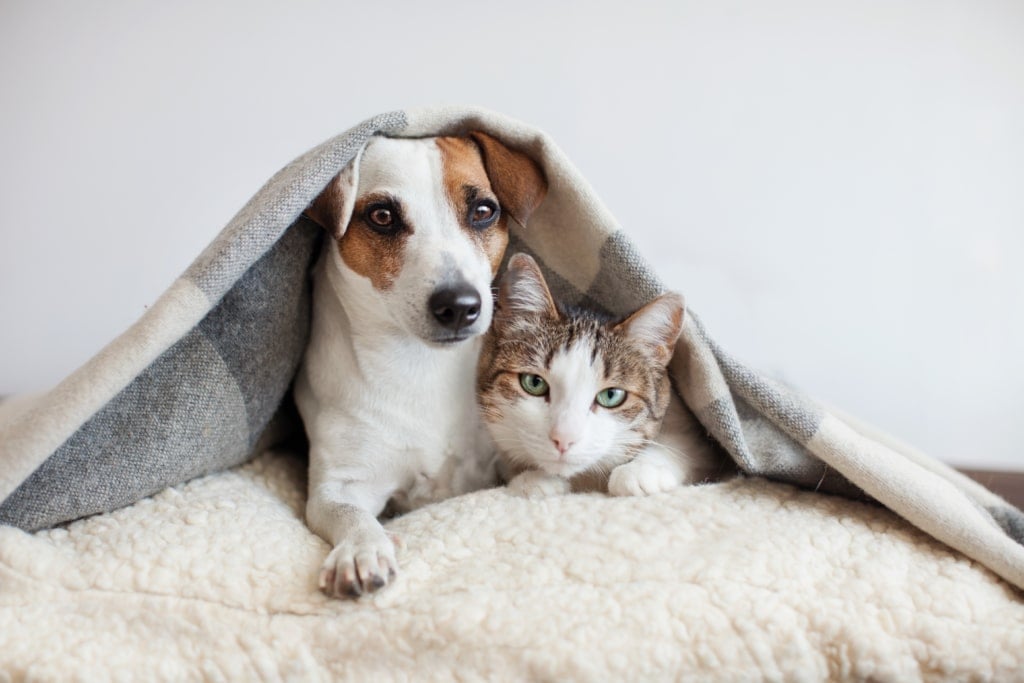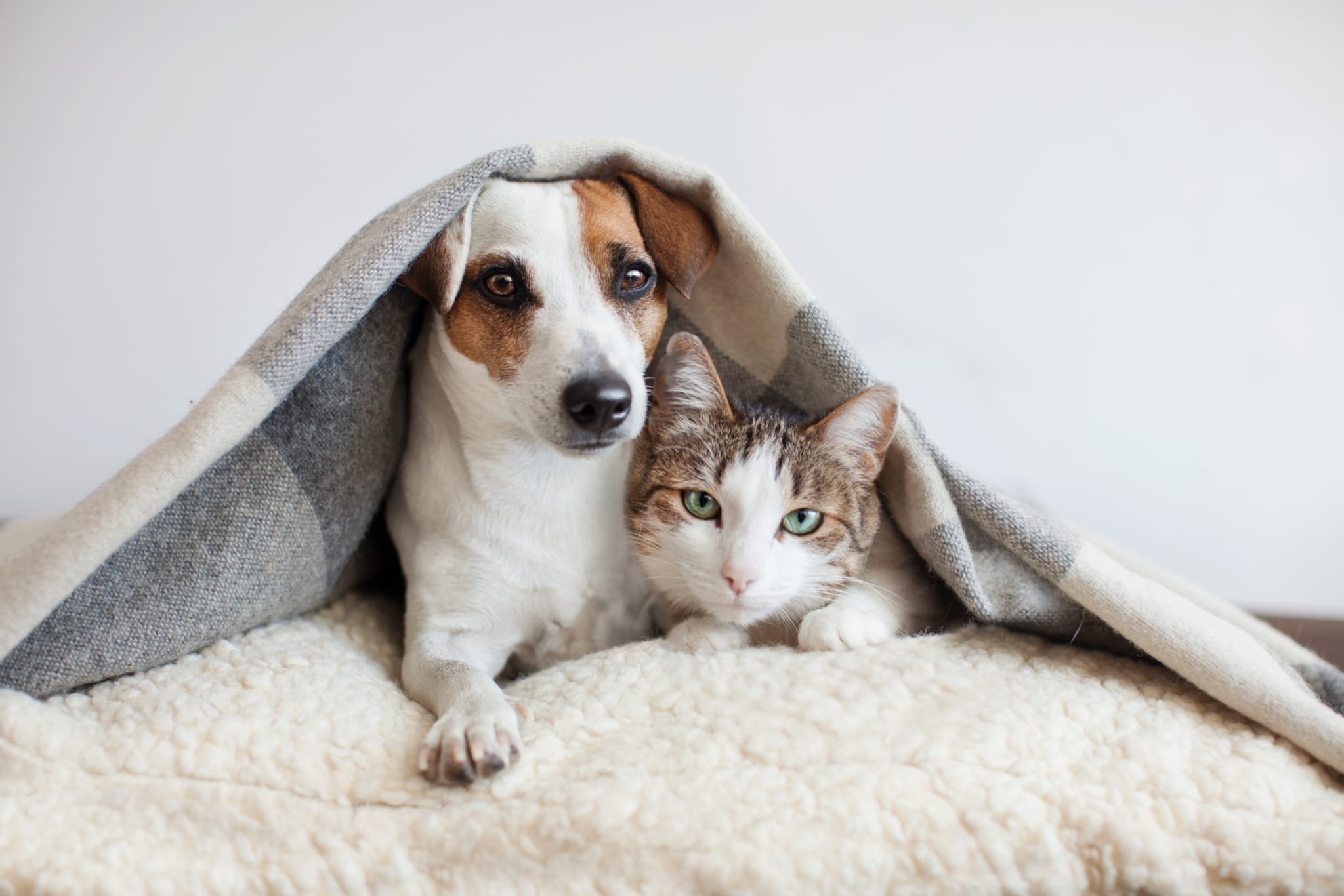How to Keep Your Pets Safe as Temperatures Drop

The colder months can be magical for many people and pets alike who enjoy playing in the snow.
However, there are some things to keep in mind to ensure your pets stay safe as temperatures begin to drop, including making sure they’re warm, fed, and happy! Read on for the top 15 tips on what to do for your pets when temperatures drop.
1. Maintain Ideal Temperatures
If it’s too cold for you, it’s certainly too cold for your pet. Though some pets, such as huskies, malamutes, or Maine Coons, are built to handle the cold, most other pets have a significantly lower tolerance.
If you are feeling chilled, then chances are your pets are as well. So, avoid frostbite or even hypothermia by keeping your home and furry friends’ habitats at a pleasant temperature.
With that being said, it’s equally important not to let your animals overheat. Don’t put your pet’s enclosure too close to a direct heat source, such as a radiator, fireplace, or heating vents.
Additionally, elderly dogs or overweight pets can find it difficult to moderate their body temperature if the room is too warm. Try to keep the house at a decent temperature without turning it into a sauna!
2. Prepare for Emergencies
When temperatures drop, many emergencies can occur, such as power outages due to severe storms. Make sure that you are prepared to handle such situations for yourself and your pets.
Have food and water for your furry friends and any medications they might need. Ensure they are also part of the emergency plans you have for emergency preparations.
3. Watch Out for Respiratory Problems
Like some humans with respiratory issues like asthma, the colder weather can cause problems for certain pet breeds that already have trouble breathing. This includes short-snouted or flat-faced pets like pugs, bulldogs, Persian cats, etc.
Make sure they have proper care available for their respiratory systems and that you monitor their breathing when outdoors in the cold.
4. Avoid Salty Paws
While road salt and ice melt can be a lifesaver for drivers and pedestrians when the weather turns cold and the pavement freezes, such substances can be detrimental to your pet’s delicate paws.
The chemical compounds in road salts can cause damage to your pet’s paw pads and the sodium itself, should your dog or cat ingest it in high quantities. Pop some pet booties on or have a towel waiting at the door to clean off their feet immediately.
5. Be Cautious of Antifreeze
Like road salts for deicing, antifreeze is another standard product for use during the wintertime that can be detrimental to pets. You should always monitor your pets around chemicals; antifreeze is no different!
Antifreeze poisoning is among the top issues pet owners face when the snow starts falling. It can be transferred onto your pets’ paws simply by crossing the street or going through melted snow. It tastes sweet to animals, and they will generally lick it up when it spills from the car or washes into the gutters, leading to major health issues.
Keep a towel by the door with some warm water so that when you arrive home, you can rinse off their paws and pat them dry completely to eliminate any risky chemical residue.
6. Increase Visibility at Night
Wintertime decreases drivers’ visibility, with the days getting shorter and the weather growing dim. Add reflective tape or fabric to your coat and your pet’s collar and leash to avoid being hit by a car that doesn’t see you in the dark.
You can even find glow-in-the-dark toys and balls for your dog to chase, making it easier for you to see them and for other people to spot your pet.
7. Invest in Pet Clothing
For very short-haired pets, it might be a good idea to invest in some specially-made pet clothing for the colder months. It may take some training and bribery with treats, but your pets will likely feel much more comfortable with a sweater when it’s cold.
Plus, you can channel your holiday spirit with festive pet clothing for Thanksgiving, Christmas, and the New Year! And pet clothing can also come with reflective strips already sewn in for better evening visibility.
8. Make Exercise Accommodations
For indoor pets, the colder temperatures can put a damper on their typical exercise routines. Your pets might still be able to venture out into the winter wonderland for exercise, but not for long.
Instead of taking your typical trail, try taking shorter but more frequent walks with your pet during the day.
This practice will still allow you to get out of the house and exercise but also avoid weather-associated health risks like frostbite or breathing issues with overexposure to the cold.
If one of your furry friends cannot run or play in the snow and ice, you must supplement their routine with at-home exercise.
Amp up the amount of playtime you give your indoor pets, and throw in plenty of stimulating activities to keep their brains engaged!
9. Check Water Bowls for Ice
Even if your pets are indoor animals, it’s essential to check their water bowls and make sure they haven’t frozen over. This is particularly true for pet feeding stations near a window or a back door, where cold air can affect the water.
And if you have outdoor pets, it’s essential to keep checking their drinking sources for ice and ensure they have a constant supply of available water.
10. Keep an Eye on Your Car
Particularly if you have outdoor cats, the lure of a preheating car can be irresistible. Many pet owners come out to their running vehicle to find a furry friend warming up inside the wheel well or underneath the car somewhere.
Always check around and under your car before driving off to avoid any animal hitchhikers from coming along for the ride.
11. Make Sure They Stay Warm
It should be no surprise that small birds and mammals like guinea pigs, mice, rats, and parrots are all more susceptible to the cold than other pets.
Ensure their enclosures receive adequate heat and shelter to stay comfortable. These animals have a more difficult time heating their little bodies, so you need to provide heating sources for them!
For other indoor pets, please give them a cozy place to rest instead of the cold floor, such as an igloo bed or radiator bed, and put some extra blankets out for them to snuggle.
If you have outdoor pets, ensure they have proper and well-maintained shelter for the colder months.
This includes raised floors within the habitat; straw, hay, or wood chippings for insulation; solid walls and a roof; and protection from any wind and snow that might blow in through the entry in the form of a plastic or burlap flap.
12. Don’t Leave Them in the Car
Like leaving your pets in a hot car during the summer, taking them with you to run errands only to leave them behind in a heat-less vehicle in the winter is not a good idea.
Cars will quickly turn cold, and your pets can freeze if left there for extended periods without heat.
13. Use a Leash
The snowy landscape, or icy scenery if you’re living in Texas, can look very different to your pet while playing outside or on a walk, so make sure they stay on a leash or a harness to ensure they don’t get confused and lost while experiencing the winter wonderland.
Additionally, if you become separated from your pets, ensure their collars have all your current contact details and other registration information that will make it easier to get them returned to you.
14. Weigh Pets Regularly
Many pets’ winter coats provide them with a poofy outer layer, but it can hide the fact that they are not getting enough food for the energy they are burning to keep warm or disguise a medical issue that causes them to lose weight.
Weigh your pets often during the colder months to ensure they maintain a healthy mass, and try not to feed them too much “people food” over the holidays!
15. Get Pet Insurance
While it’s essential to make particular arrangements for your furry friend’s health and safety during the wintertime, you should get a pet insurance policy to keep them safe year-round.
Ask your insurance agent about pet insurance coverage today, and get protection for medical issues, illnesses, and other pet-related risks you might encounter!



